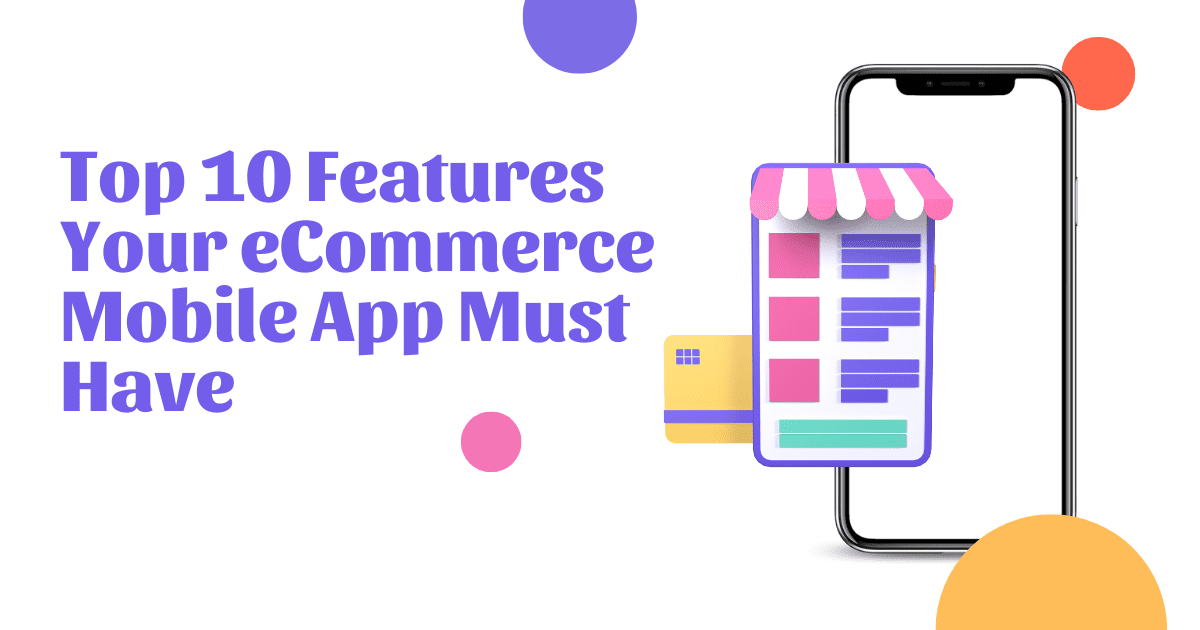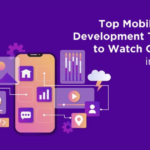Top 10 Features Your eCommerce Mobile App Must Have

The increasing number of tech-savvy consumers has contributed to the mainstream acceptance of eCommerce apps. Since the birth of the eCommerce industry, people have also found it much easier to shop online. After the pandemic started, this was no longer a luxury but a necessity. In addition, you can shop online without the inconvenience of turning on your desktop computer and signing in. The growth of the online retail sector can be directly attributed to the popularity of smart devices, notably mobile phones. Mobile shopping apps have become commonplace. Businesses nowadays are capitalizing on the preferences of today’s shoppers.
In what ways can the most popular functions of your mobile shopping app help your company and its customers?
In general, your m-commerce app should be stocked with tools that streamline the shopping process, impress with their UX, and encourage repeat business.
Overall, your mobile shopping app’s features should boost revenue, cement client loyalty, and give your company an edge. Read “What Is mCommerce?” for a definition of mobile commerce and a primer on the subject if you’re starting in the field. If you want develop your ecommerce mobile app, you can go with the best Mobile app development company in Dubai.
The Top 10 Functions for Your Mobile eCommerce App
1. Easy login & registration
Simplify sign-up processes by enabling users to sign in with just an email address, through social media or other third-party services like Google or Facebook, or with a personal passcode. More customers will buy because of the simplified purchasing process.
2. Product sorting and filtering that is simple to use
Available sorting and filtering tools are essential if you offer various products. Customers are more likely to buy from you and remain loyal to your company if they have a better shopping experience and fewer obstacles to overcome.
3. Extensive explanations of the goods
Long, thorough product descriptions may seem pointless when added to e-Commerce mobile apps. After all, don’t you think customers care more about viewing the actual product images? Who has time to read a lengthy article on their phone? Product descriptions are crucial whether you’re shopping on a mobile device or a desktop computer. You may lessen the likelihood of product returns, impulsive purchases, and unhappy consumers by giving them as much information as possible about your offerings.

4. A showcase of products
A product page is only complete with a product gallery showcasing multiple images of the item. Customers who prefer to try before they purchase may be put off by the inability to do so when shopping online. You can effectively handle this issue by including several images that display the item from various angles and settings.
5. WishList
You should include a wishlist function in your eCommerce mobile app. It’s a place for potential buyers to collect items as they shop online. Buyers frequently return to complete their purchases even after buying some of the things on their wish lists. This results in more returning customers and strengthens their loyalty to your brand. Customers appreciate the ability to “heart” items without immediately adding them to their purchasing basket. Retailers can utilize the wishlist as a source of information to increase sales by contacting customers with reminders and suggested purchases.
6. Personalized Customer Experience
Customers should be sent targeted product offers and recommendations once they have finished perusing the items of interest and purchased. To facilitate individualization, many modern stores use complex recommendation systems. It’s simple to get a consumer interested in products, deals, and discounts tailored to their preferences and, ultimately, more likely to result in a sale. The reach of a business and the level of customer interaction with a brand can benefit from personalized content. As a result, you should expect increased customer retention and repeat business. Personalization has been around for a while, but using its potential in eCommerce shopping apps is more important than ever.
7. Voice-Activated Artificial Intelligence Assistant
Big names in online retail are testing the waters with voice shopping to improve the customer experience. The only thing stopping merchants from getting creative is their lack of imagination. Voice assistants powered by artificial intelligence (AI) allow users with limited mobility to have a positive app experience and make purchases. As a result, it’s clear that voice assistants are here to stay and will be a valuable addition to your e-commerce platform.
8. Lightning-quick checkout
The checkout process is the last chance to make a sale. Therefore, your eCommerce mobile app must make it easy for customers to complete their purchases. Any modern e-commerce app needs to include functions like guest checkouts and profile-based automatic checkout details. The user should spend as little time as possible finishing the transaction. When attempting to reduce shopping cart abandonment, this is a critical component.
9. Policy for Quick Returns
Customers still take a chance when they shop online, and sometimes the goods they receive are subpar. When searching for an online store’s return policy, some customers give up and abandon their purchases. Customers are more inclined to buy from you again if the return policy is straightforward.
10. Assistance to Clients
Due to the lack of personal interaction, shopping online is very different from visiting a physical store. You can connect with your online shoppers and solve their problems by offering live chat, email, and phone support. Another way to boost customer service is offering a callback to help users immediately or at a scheduled time.
In what ways may a mobile app help an online store?
After reading all those numbers, you might be left wondering why exactly consumers prefer mobile applications while purchasing online. What sets the mobile buying experience apart from using a mobile browser or a desktop site?
So, try not to worry too much. What motivates customers to utilize eCommerce apps, and why should you consider making one for your online store? OK, so let’s get going.
1. Recognition of the brand has grown
Enhanced brand recognition is key to investing in mobile eCommerce app development. It’s also the primary benefit of mobile shopping.
Since most consumers spend a considerable amount of time on their mobile devices, a mobile eCommerce platform provides brands with a simple means of connecting with these consumers. Users of apps on mobile devices are known to get angry more quickly, and data shows that 32 percent of people will remove an app if they find it difficult to use. A poor user experience is the result of this. That’s why it’s so important for companies to provide their customers with a smooth and intuitive mobile app experience.
2. Better interactions with customers
Modern consumers anticipate constant individualization throughout their interactions with a given brand. This will not occur if you only use your website to communicate with your customers. Use a mobile app to make it simple for your customers to become repeat buyers.
3. Increased interest among site visitors
Get the word out that you, too, can benefit from the technology your customers use. Adding support for user phones’ functions can make your app easier to use and more interesting to your audience.
4. The conversion rate is far higher than that of the web
Using a mobile app to shop online is shown to increase sales. This is the only metric that counts because it directly impacts financial success.
5. Reduce cart abandonment rates
Historical data shows that mobile app checkout processes decrease car abandonment rates. Users’ billing and delivery information is saved in the system, allowing for one-click checkout. Customers can move through the checkout process more quickly and efficiently.
Author bio: Silvi Willemson is a tech blogger and an avid reader. She has written various blogs and articles about the latest developments in blockchain technology like StepN clone, Metaverse, Mobile app development, Iot Development and AI. When she is not researching or writing, she is probably playing Call of Duty, she is an avid gamer too!
Ready to Get Started?
Your Details will be Kept confidential. Required fields are marked *




